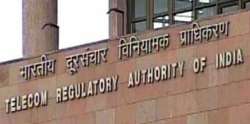Unleash market forces to realise full potential of satellite communication: TRAI
Telecom and broadcasting regulator TRAI on Thursday advocated the need to unleash market forces to realize the massive potential of satellite communications and technologies in India, and said regulatory disadvantages need to be "ironed out".

Telecom and broadcasting regulator TRAI on Thursday advocated the need to unleash market forces to realise the massive potential of satellite communications and technologies in India, and said regulatory disadvantages need to be "ironed out".
Telecom Regulatory Authority of India (TRAI) Chairman RS Sharma rued that cost of data in India delivered via satellite technology was 400 times higher than that in the US, presenting a stark contrast to telecom and mobile services domain where India is offering one of the cheapest tariffs in the world.
Sharma asserted that the 'open sky policy' needs to be implemented in "letter and spirit" to unleash the full potential of satellite technologies.
"The reason is not inefficiency of technology...the reason is that we have probably not allowed unleashing of market forces or not allowed to implement the open sky policy which was part of earlier telecom policy and also a part of the National Digital Communications Policy.
"We need to implement the open sky policy in letter and spirit," Sharma said addressing the India SatCom 2019 organised by Broadband India Forum.
Sharma cautioned that any protectionism in the satellite communications area would be to the detriment of consumers. Newer breeds of satellite communications technologies are coming up, opening up possibilities for advance applications.
"So, it is not as if there are technological disadvantages. I think...regulatory disadvantages need to be ironed out," he said. He said the government and TRAI are cognizant to the need for unleashing market forces to benefit customers.
The TRAI chief also said the regulator has always advocated use of different methods to enhance connectivity in the country, be it leveraging Wifi or Cable TV for broadband.
Listing out advantages and vast applications of satellite-based connectivity, Sharma said although the usage of satellite communications is currently limited, scale will bring down prices drastically.
"How is it happening in telecom in data prices? Ultimately it is...about...allowing usage of these things and I am sure the costs will come down," he said.
Sharma said for technologies to be successful in India they would need to be affordable, inter-operable and scalable. "I completely agree that there is a huge potential for satellite technologies in this country and there are many sectors where it is needed, it has its USPs (Unique Selling Proposition)," he said.